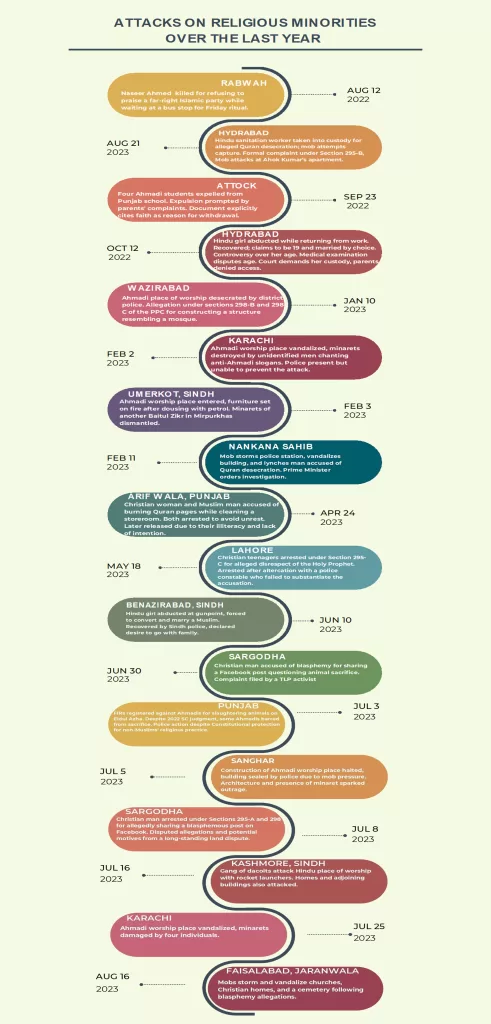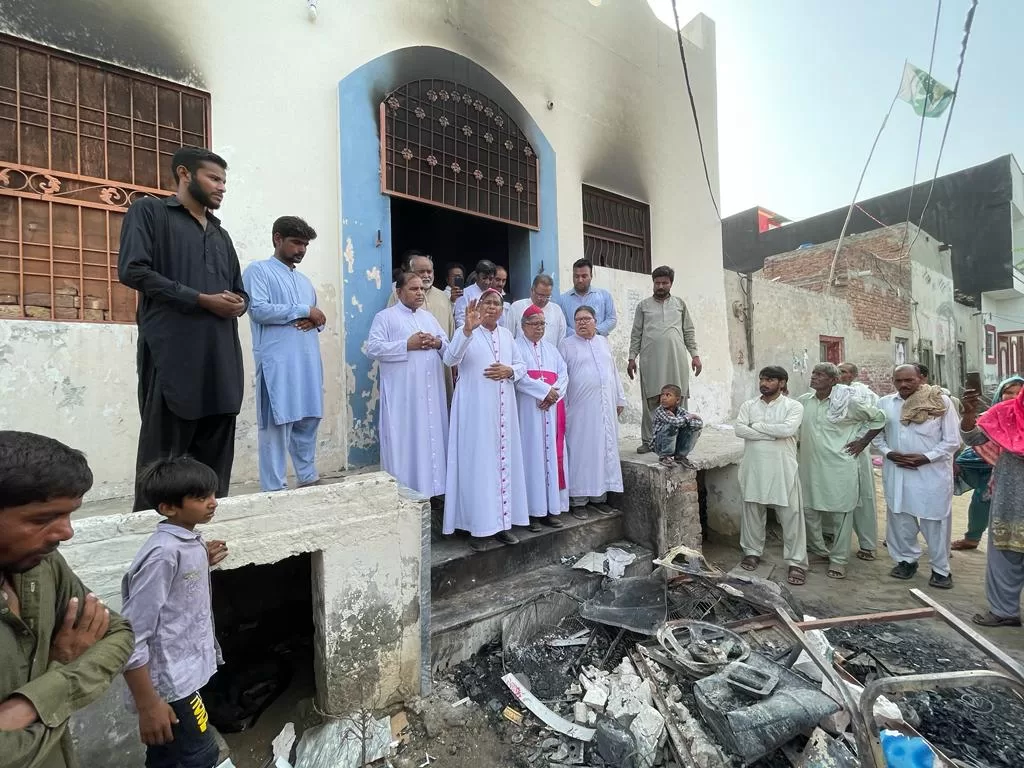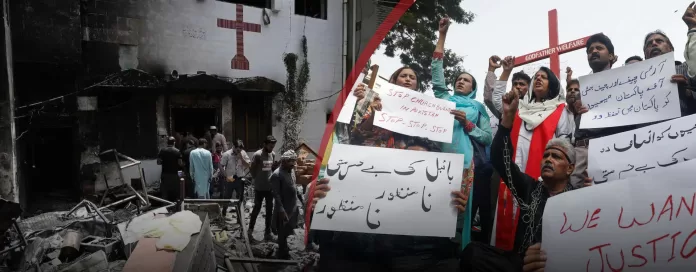In recent times, Pakistan has witnessed a series of distressing incidents that highlight the vulnerabilities faced by its minority communities. These incidents shed light on the alarming frequency of attacks against minorities, particularly in cases of blasphemy allegations and forced conversions. A closer look at the available data paints a grim picture, emphasizing the pressing need for minority-friendly law enforcement policies and practices to ensure the safety and rights of all citizens, regardless of their religious affiliations.
In a poignant demonstration of the alarming state of religious intolerance, the events of a single day, August 16, 2023, in Jaranwala, sent shockwaves through Pakistan. In a disheartening turn, a staggering 19 churches were ransacked within hours, leaving a trail of destruction that exposed the fragility of minority rights and the pressing necessity for an inclusive and minority-friendly law enforcement approach. The catalyst for this rampage was rooted in allegations of blasphemy against two Christian brothers, an accusation that tragically served as a rallying point for a mob bent on chaos. Exploiting religious sentiments, the mob skillfully galvanized local neighborhoods, harnessing the power of collective emotions to justify their violent actions. This disturbing incident was characterized by an alarming announcement made through a mosque, which went beyond seeking accountability from the accused brothers to demanding vengeance from the entire Christian community—regardless of age or gender.
Remarkably, this outbreak of hate and violence occurred without any proper investigation or police intervention. The absence of a swift and measured response from police allowed the dangerous game of intolerance to unfold unchecked. Sadly, it wasn’t until national media picked up the story that the police mobilized, a pattern that echoes similar instances in the past. By the time law enforcement took control, the damage had been irrevocably done, emphasizing the dire need for immediate intervention and preventive measures. The aftermath of the incident saw numerous arrests, including those of the accused brothers, but the deeper implications extend beyond individuals. This incident is not an isolated one; it’s a chilling echo of a larger series of violent acts that have targeted minority groups under the guise of religious fervor. The Jaranwala incident serves as a glaring reminder of the vulnerability of religious minorities.

Minority Communities in Pakistan
A Detailed Account – The incidents of persecution against minority communities in Pakistan present a disheartening pattern that underscores the need for urgent reforms to ensure the rights and safety of all citizens, regardless of their religious beliefs. A closer examination of these incidents reveals a troubling narrative of discrimination and violence against minority groups:
Blasphemy Allegations
An Ongoing Concern – The Human Rights Commission of Pakistan (HRCP) reported a staggering 585 cases of blasphemy registered by the police in the year 2021 alone. This distressing statistic is most pronounced in the province of Punjab. Alarmingly, at least 16 of these cases were filed against members of the Ahmadi community, a minority group that has long been targeted due to their religious beliefs.
According to data compiled by Al Jazeera, the period since 1990 has seen at least 80 individuals lose their lives in connection with blasphemy allegations in Pakistan. Moreover, it is disheartening to note that more than half of all online hate speech in Pakistan, amounting to 53 percent, is directed towards the Ahmadi community. This digital hostility not only underlines the challenges this minority group faces but also highlights the urgent need for effective measures against online hate speech.
The violence resulting from blasphemy allegations has marred Pakistan’s human rights record and has left a trail of tragedy in its wake. While formal executions for blasphemy are rare, the number of convictions is substantial.
Many convictions are ultimately overturned on appeal, but the damage inflicted by vigilantism cannot be undone. Lynchings, public executions, and brutal acts of violence have been perpetrated against those accused of blasphemy, often without a fair trial. Disturbingly, the judiciary has at times succumbed to external pressures and threats of violence, leading to convictions that may lack proper evidence and due process.
This widespread violence not only underscores the dangers posed to individuals but also raises questions about the role of law enforcement and the judiciary.

Forced Conversions and Vulnerable Girls
According to the report of HRCP, a staggering 60 cases of forced conversions have been reported in local media. Shockingly, around 70 percent of these cases involve girls under the age of 18, with a significant concentration of incidents occurring in the Sindh province. This troubling trend not only highlights the plight of these young girls but also underscores the broader issue of protecting the rights of minority communities.
Analyzing the Crucial Role of Law Enforcement
The incidents of persecution against minority communities within Pakistan serve as a stark reminder of the pressing requirement for law enforcement agencies to reevaluate and adopt policies that prioritize the rights and protection of these marginalized groups. In an analytical lens, it becomes evident that a more inclusive and equitable approach from police, coupled with minority-friendly policies, could potentially mitigate the distressing frequency of such incidents. By delving deeper into the root causes of these troubling events, it becomes apparent that the current law enforcement landscape in Pakistan lacks the mechanisms necessary to adequately safeguard the rights of minorities. An inherent bias or insufficient training could contribute to the perceived neglect of minority rights, which in turn perpetuates an environment where acts of persecution and discrimination persist. The essence of effective laws should encompass the unwavering principle of equal protection under the law, irrespective of one’s religious background. If law enforcement agencies were equipped with the responsibility and capability to ensure unbiased protection, these incidents might be significantly curbed. By fostering an environment where all citizens, regardless of their faith, feel secure and assured of their rights, the motivation for such attacks could be greatly diminished.
Furthermore, there is the need for comprehensive reforms in policy-making. The implementation of minority-friendly policies would not only signify a commitment to upholding the values of diversity and inclusivity but also demonstrate a willingness to rectify past injustices. Another crucial step in addressing these issues lies in transforming the behavior of police personnel through targeted training modules.
A focus on behavioral change will empower them to handle cases involving minorities, especially forced conversions, with fairness and sensitivity. By promoting an atmosphere of empathy and understanding, such training can play a vital role in ensuring that the rights of minorities are upheld and protected.
These policies, if crafted with sensitivity and foresight, could establish a framework that safeguards minority rights and guarantees their freedom from persecution. An examination of the interplay between law enforcement practices, minority rights, and policy-making reveals a profound need for a paradigm shift. The challenge lies in transforming our police into a proactive force that not only reacts to incidents but actively prevents them through a holistic approach to protection and advocacy. It is through such measures that Pakistan could truly pave the way towards a more harmonious and just society for all its citizens, regardless of their religious affiliations.
Conclusion
The magnitude of violence becomes all the more disconcerting when considering the sheer number of individuals who have lost their lives due to weaker law and judicial system in Pakistan. The societal implications of these violent incidents are significant. They contribute to an atmosphere of fear and self-censorship, where individuals may be reluctant to express their beliefs or opinions freely. This stifling of discourse undermines the principles of freedom of expression and human rights, ultimately impeding the nation’s social progress. These tumultuous events underscore the fact that a mere legal framework is insufficient to protect them.
References
1. Asif Mehmood. (2023b, February 11). Mob lynches man over blasphemy allegations in Nankana Sahib. The Express Tribune. https://tribune.com.pk/story/2400657/mob-lynches-man-over-blasphemy-allegations-in-nankana-sahib
2. Bukhari, M. (2022, August 12). Man from Ahmadi minority stabbed to death in Pakistan. Reuters. https://www.reuters.com/world/asia-pacific/man-ahmadi-minority-stabbed-death-pakistan-2022-08-12/
3. Correspondent, T. N. S. (2022a, August 23). Hyderabad locality tense after rioting. DAWN.COM. https://www.dawn.com/news/1706235
4. Correspondent, T. N. S. (2022b, October 21). Court orders medical examination of converted Hindu girl to verify age. DAWN.COM. https://www.dawn.com/news/1716045
5. desk, N. (2023, August 11). Police recover 12-year old missing boy. Pakistan Observer. https://pakobserver.net/police-recover-12-year-old-missing-boy/
6. Hussain, A. (2023, August 16). Mobs burn Christian churches, homes in Pakistan after blasphemy allegations. Www.aljazeera.com. https://www.aljazeera.com/news/2023/8/16/angry-mobs-burn-christian-churches-in-pakistan-after-blasphemy-allegations
7. Khan, M. H. (2022, August 22). Unrest in Hyderabad after alleged desecration of Quran. DAWN.COM. https://www.dawn.com/news/1706155/unrest-in-hyderabad-after-alleged-desecration-of-quran
8. Nawab, K. (2023, July 15). Pakistan: Christian Man Arrested On Blasphemy Charges In Sargodha. Eurasia Review. https://www.eurasiareview.com/16072023-pakistan-christian-man-arrested-on-blasphemy-charges-in-sargodha/
9. Saeed, A. C. | T. (2023, August 17). 5 churches, many homes ransacked in Faisalabad’s Jaranwala. DAWN.COM. https://www.dawn.com/news/1770582/5-churches-many-homes-ransacked-in-faisalabads-jaranwala




